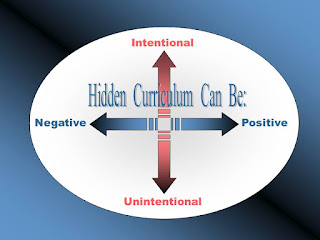In my previous post Lessons in Absences: The Power and Importance of the Null Curriculum, I explained that there are three distinct subsections of curriculum: the null curriculum, the explicit curriculum, and finally the hidden curriculum. Since the explicit curriculum is simply what can be found in curriculum documents, and my last post was on null curriculum I thought that I would take the opportunity to take a look at hidden curriculum.
 |
| A brief explanation of what is learned through hidden curriculum and how some of these lessons are imparted (source) |
In retrospect I have learned a number of lessons from hidden curriculum throughout my educational experience. Some have been good things like learning to treat others with respect and being polite. Others have been things that were actually somewhat harmful, such as learning that it was considered inappropriate to like certain colors and toys, that marks were the only important thing in school, and that it is wrong to question what a teacher tells you.
 |
| Simplified depiction of the potential effects of Hidden Curriculum (source) |
Unfortunately, as is suggested in The Glossary of Education Reform, "The hidden curriculum is described as “hidden” because it is usually unacknowledged or unexamined by students, educators, and the wider community. And because the values and lessons reinforced by the hidden curriculum are often the accepted status quo, it may be assumed that these “hidden” practices and messages don’t need to change." As a future educator I will maintain awareness of both the dangers, and potential of the hidden curriculum, and attempt to ensure that any hidden curriculum in my classroom will have a positive effect on my students. In order to achieve this ends I will attempt to be aware of my own prejudices and either overcome them, or keep them separate from the classroom in order to avoid passing them on to students through the hidden curriculum.
A fun video from Youtube explaining hidden curriculum and some of its dangers (Source)
In closing, it is evident that the hidden curriculum is incredibly important to the educational process. In an increasingly more complex and diverse educational system it is increasingly important for all educators to critically examine the hidden curriculum in their own classroom and how it may affect their students. It is also vital for them to recognize that while the hidden curriculum is often unintentionally a powerful instrument of social reproduction, by being conscious of what hidden messages they are imparting to students the hidden curriculum can be used as a powerful instrument of social change.